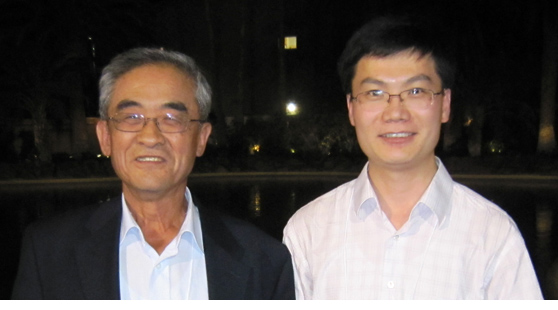Computer Scientists Win Best Paper Award at MobiCom ’11 Conference

 Enlarge
Enlarge
Professor Kang G. Shin and Ph.D. student Xinyu Zhang have won the Best Paper Award at the 17th Annual International Conference on Mobile Computing and Networking (MobiCom), which took place September 19 – 23, 2011 in Las Vegas.
The paper, entitled “E-MiLi: Energy-Minimizing Idle Listening in Wireless Networks,” addresses the issue of excessive power consumption during idle listening (IL) time for wireless WiFi devices. Most existing protocols, such as the 802.11 power-saving mode (PSM), attempt to reduce the time spent in IL by sleep scheduling. However, through an extensive analysis of real-world traffic, the researchers found more than 60% of energy is consumed in IL, even with PSM enabled.
To remedy this problem, Shin and Zhang propose an approach that reduces the power consumption in IL, given that the time spent in IL has already been optimized by sleep scheduling. Observing that radio power consumption decreases proportionally to its clock-rate, E-MiLi adaptively downclocks the radio during IL, and reverts to full clock-rate when an incoming packet is detected or a packet has to be transmitted. E-MiLi incorporates sampling rate invariant detection, ensuring accurate packet detection and address filtering even when the receiver’s sampling clock-rate is much lower than the signal bandwidth. Further, it employs an opportunistic downclocking mechanism to optimize the efficiency of switching clockrate, based on a simple interface to existing MAC-layer scheduling protocols.
The researchers have implemented E-MiLi on the USRP software radio platform. Their experimental evaluation shows that E-MiLi can detect packets with close to 100% accuracy even with downclocking by a factor of 16. When integrated with 802.11, E-MiLi can reduce energy consumption by around 44% for 92% of users in real-world wireless networks.
Prof. Shin is the Kevin and Nancy O’Connor Professor of Computer Science, and is the Founding Director of the Real-Time Computing Laboratory (RTCL) in the Electrical Engineering and Computer Science Department at The University of Michigan. His current research focuses on computing systems and networks as well as on embedded realtime and cyber-physical systems, all with emphasis on timeliness, security, and dependability. He has supervised the completion of 68 PhDs, authored/coauthored more than 760 technical articles and more than 20 patents. He has co-authored (with C. M. Krishna) a textbook, “Real-Time Systems,” McGraw Hill, 1997. He is a Fellow of IEEE and ACM, and an overseas member of the Korean Academy of Engineering.
More info:
Smartphone Battery Life Could Dramatically Improve with New Invention
 MENU
MENU 
